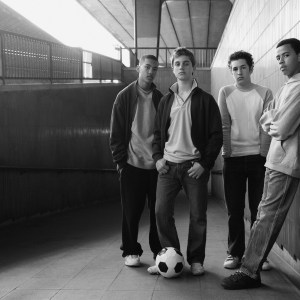CES hosts talk on integration of Islam into contemporary France
Civil unrest in several Parisian suburbs during the fall of 2005 captured media attention worldwide and brought to light the challenges of social integration faced by the Muslim community in France. According to Jonathan Laurence, assistant professor of political science at Boston College, and Justin Vaisse, senior fellow at the Brookings Institution, the events also perpetuated what they call popular misconceptions about the nature of French Islamism.
Laurence and Vaisse visited Harvard’s Center for European Studies (CES) last Friday (May 2) to speak about the “realities” of life for the nearly 5 million Muslims who make their home in France. The discussion was based on Laurence and Vaisse’s recent book, titled “Integrating Islam: Political and Religious Challenges in Contemporary France” (Brookings Institution Press, 2006).
“The popular school of thought on this subject is quite alarmist and paranoid,” said Vaisse. “We hope to go beyond the headlines and snapshots, to paint an accurate picture of the conditions in which French Muslims live, work, and play. Islam extends beyond the suburbs,” Vaisse explained.
Vaisse opened the discussion by outlining what he and Laurence consider to be the four primary “myths” that govern American impressions of French Muslims.
The first myth holds that the Muslim population is growing extraordinarily rapidly in France.
“Some estimate that there will be as many as 20 million Muslims by the year 2020,” Vaisse said. “However, the number of Muslims — considered by virtue of their family background — is not growing nearly that fast.” Vaisse also noted that in France the birthrate of children to immigrant families is not nearly as high as in Germany or Italy.
Americans also err, Vaisse contended, in their perception of French Muslims as a “distinct, cohesive, and bitter group.”
“That idea is just wrong,” he said. “Muslims in France are not a cohesive group, and they certainly don’t vote that way. There are cleavages based on many factors, including the country of origin or reference and specific ideology.”
Yet another of the “myths” that Laurence and Vaisse ascribe to American opinion is the notion that Muslims seek to “undermine the rule of law” in France.
“Muslim citizens assert confidence in France and in French democracy much higher than they do in other countries,” said Vaisse, citing a 2005 state department poll. He noted, however, that many residents of France who do not hold citizenship have expressed strong discontent with the government.
The final American misconception that composes the “alarmist school of thought,” said Vaisse, suggests that the Muslim population exerts a subversive influence on French foreign policy.
“The political impact of the Muslim population is very minimal on foreign policy or the fight against terrorism,” said Vaisse. “Only about three out of five Muslims in France are voting citizens. They are interested in issues like employment, discrimination, inflation, and education. There is no evidence that French foreign policy would look any different absent the Muslim population.”
According to Laurence and Vaisse, the unrest in France has little to do with the Muslim religion and culture.
“The failure of the French model is not about the religious aspect of Islam,” Vaisse said. “The failure is about social integration and discrimination.”
Laurence and Vaisse suggested that the affordable housing units constructed on the outskirts of Paris, where many immigrant populations tend to concentrate, have fostered an “isolation and ghetto phenomenon” that results in a high concentration of social ills.
“The people who live in these areas feel remote and cut out from the rest of French life,” said Vaisse.
Both scholars said that racial discrimination and racial profiling remain a large challenge for many French Muslims.
“It is very difficult to get jobs,” Vaisse said. “Unemployment is 40 to 50 percent in some housing projects, which creates resentment vis-à-vis the school system. If you can’t even get a job when you have done well in school, why bother?”
After “debunking” American myths about Islam in France and discussing the social problems that plague the suburbs, Laurence offered a brief analysis of the efforts made by French President Nicolas Sarkozy to ameliorate the situation.
At the outset of the 2005 riots, Sarkozy was widely criticized for describing the youth involved as “racaille,” a derogatory term that translates loosely as “rabble.” Some argued that his comments sparked further violence and contributed to the spread of the unrest beyond Paris and throughout France.
Laurence agreed that Sarkozy made a “brutal choice of vocabulary and language, effectively cutting off the discussion with an entire constituency.” However, Laurence argued that in the subsequent months Sarkozy has associated more with religious communities and groups than any other French president in history.
“I am apologizing for him in part to provoke you,” Laurence quipped, before outlining what he sees as Sarkozy’s attempts to ease social unrest.
Previously, said Laurence, the standard government response was to throw tens of millions of francs at the ministry of urban affairs to build more soccer fields and rec rooms, “as if football and foosball were the solution to the problem.”
Sarkozy, by contrast, has “faith in the power of religion to improve people for the better,” said Laurence. He suggested that recently Sarkozy has been eager to recognize and acknowledge the Muslim community. For example, in 2007 the president completed an official state visit to Algeria, where he spoke on the importance of faith in citizenship and faith to society. Laurence also highlighted Sarkozy’s support of the French Council of the Muslim Faith (CFCM), a nonprofit group created to foster dialogue between French Muslims and the government.
When pressed on Sarkozy’s political motives for displaying interest in the concepts of faith and community, Laurence agreed that Sarkozy takes a conservative view of community and the function it can provide for the state.
“He is certainly thinking about its usefulness and specific purposes,” said Laurence, “perhaps to gain some control over the ideological influences of many of the citizens of his country.”
The event was sponsored by the Seminar on French Politics, Culture and Society, a CES study group. Laura Frader, professor of history at Northeastern University and associate of the Center for European Studies, moderated the discussion.




